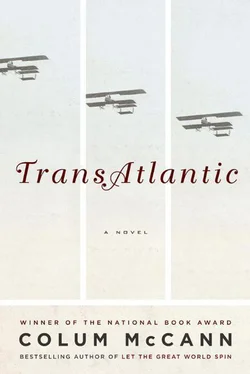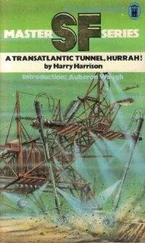It was almost eight o’clock in the evening when I finally pulled up outside the Shelbourne, an expensive treat for myself. The valet, a vile little Spanish snob, looked at the car and then at me with more disdain than I can possibly describe, and then I was curtly told that there were no dogs allowed. Of course not. I had to admit to myself that I had known it all along. No point fooling any longer. Not much beyond a snob myself, of course. I feigned outrage and indignation, then promptly got snarled in the traffic again. The truth was I had hardly any money left at all, certainly not for the luxury of a hotel.
Georgie and I slept in the car park by the beach out at Sandymount. Four other vehicles alongside me. Homeless families, I presumed. There was the vacant thought of how ordinary my own problems were. The families were sandwiched tight in their cars. Blankets and hats pulled up around them. All their possessions piled high on the roof, strapped down with rope. They looked like figures from some of my mother’s earliest black-and-white photographs. We seem to have a touching conviction that these things will never happen in our own territory. As if nothing of the past can happen in the present. The Grapes of Wrath. One of the cars even had a bumper sticker: Celtic Tiger, My Arse . The Guards paid us a visit in the middle of the night, shone a torch in the window, but allowed us be. I pulled my coat high and huddled into the seat. A chill knifed through the gap in the door. I pulled Georgie into my lap to warm me, but she lost her bladder twice, poor thing.
In the morning the children from the neighboring car were staring in the window. To distract them while I changed, I asked them to take Georgie for a run along the strand. I slipped them a two-euro coin. Still, one of the little monsters said: “She smells.” Frankly, I didn’t know if she meant me or the dog. A surge of grief in my stomach. The children looked relieved to get away from me. I watched the imprint of their feet in the soft sand dissolve. An enormous stretch of gray towards the green of the headlands.
Later I walked with Georgie to Irishtown for breakfast and found a café where they allowed her to doze at my feet. I washed my coat out in the sink, dabbed my dress clean, stared at myself in the mirror. I combed my hair and put on a line of lipstick. Small matters, ancient pride.
The radio warned of more huge traffic jams. I left the car at the beach and took a taxi, which tried looping its way around towards the area of Smithfield. The driver was a local. “Keep the dog at your feet for fucksake,” he said. A roll of fat twisted at the back of his neck.
We hit more traffic and found ourselves snared. He cursed the Queen with remarkable dexterity. I had to get out and walk the last quarter mile. The driver asked for a tip. Throwaway , I thought, but before I could say anything he cursed and sped off.
Smithfield was a shabby little area of the city that didn’t fit my perception of what it might have been, but then again neither did David Manyaki who was waiting for me on the street corner.
I had expected an older man, formal, gray-haired, leather patches on the sleeves of his jacket. With silver spectacles and a gravelly manner. Perhaps he would wear one of those small African hats, I could not for the life of me remember the name of them, small and boxy and colorful. Or maybe he would look more like those tall Nigerian businessmen in their shiny blue suits and tight white shirts and baleful little bellies?
Manyaki was in his early thirties. An elegant jumble sale. He was wide of chest, muscled, with a slight touch of flab about him. His hair was in loose cornrows, but fell into short tubes that swung down to his jaw — I tried to remember the word for the style, but couldn’t, my mind wasn’t catching. He wore a rumpled sports jacket, but underneath it was a colorful dashiki, yellow with threaded silver. He shook my hand. I felt heavy and frumpy, but there was something about Manyaki that sprinkled a line of salt along my spine. He reached for Georgie and petted her. His accent was more deeply African than it had been on the phone, though there was a lilt of Oxford to it.
“Dreadlocks,” I said to him, rather ridiculously.
He laughed.
We entered a dank little café. The owners had set up a small television on the counter where they were watching the events of the day unfold: the Queen was on her way to the Garden of Remembrance. There were scattered protests in the streets. No riot guns, no rubber bullets, no CS gas. The TV commentators were interested in the notion that she had landed in a green dress. I have never been much for monarchy, and although I grew up nominally Protestant, an ancient part of me still aligned itself with Lily Duggan.
We ordered coffee. The television droned in the background.
When I showed Manyaki the letter, he held the plastic at the very edge and turned it around in his fingers. I explained to him that it was written on behalf of my great-grandmother who had worked as a young girl in the house on this very street, Brunswick, but he corrected me immediately and said that Douglass had stayed on Great Brunswick, which was now renamed Pearse Street.
“I was wondering why you wanted to meet here,” he said.
“This is not Great Brunswick?”
“Afraid not.”
I felt a flood of embarrassment that he might know more about my own great-grandmother’s workplace than me, but he was the scholar after all. He, too, seemed chagrined that he had corrected me, and said there wasn’t really all that much known about the street, or the house, since it was long knocked down, though Richard Webb greatly interested him. He said we could try to walk down to Pearse Street, but the Queen’s visit had put a tourniquet on the city.
The letter was sealed in the archival sleeve. He wasn’t perturbed at the idea that he couldn’t open it. He said he had no real idea what had happened to Isabel Jennings, though she had quite possibly helped Frederick Douglass to buy his freedom through a woman in Newcastle, an Ellen Richardson, a Quaker long active in the cause.
— He went back to America unslaved.
Unslaved . It was a curious and lovely word, and I liked Manyaki all the more for it. There was no more Brown Street left in Cork either, he said. It had been knocked down, as far as he knew, in the 1960s, to make way for a supermarket. He wasn’t sure when the Jennings family had left, though he had an inkling that it might have been during the Famine. There was a good deal of guilt for anyone to carry, he said, English or Anglo. I told him that there had been an amethyst brooch that went down through the decades also, but it had long been lost somewhere in Canada — Toronto or perhaps St. John’s.
He lifted his glasses and squinted up at the television screen. A helicopter hovered. This remarkable peace that has held so long.
Manyaki held the letter at its edges and turned it over, back and forth, then brought it close to the light until I asked him not to expose it too much as the handwriting was delicate, even inside the plastic.
What I liked most about Manyaki is that he did not ask me to open the letter, nor to borrow it so his colleagues in university could bombard it with protons or neutrons or whatever else they might use to discern what lay inside. I think he understood that I wasn’t interested in getting to the endpoint, if there was any, and that the prospect of truth was not especially attractive: for such a young man, an academic, he was still curiously interested in the elusive.
There was a collector in Chicago, he said, who had paid thousands for Douglass memorabilia. The collector had already bought a Bible that had belonged to Douglass, and had made an outrageous bid on a pair of barbells that ended up, instead, in a Washington, D.C., museum.
Читать дальше












